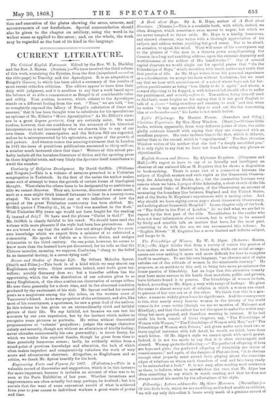Continuity of Religious Development. By David Griffith. (Williams and Norgate.)—This
is a volume of sermons preached to a Unitarian congregation in Tavistock. In the first of the series the author makes some sort of attempt to trace the growth of certain forms of theological thought. What claim the others have to be designated by so ambitious a title we cannot discover. They are, however, discourses of some merit, such as a man might think himself fortunate to hear in a country-town chapeL We note with interest one or two indications of how the ground of the great Trinitarian controversy has been shifted. Mr. Griffith quotes 1 Timothy iii., 16, as "God was manifest in the flesh." What Unitarian fifty years ago would not have fought for the reading g; instead of Oa; ? Or have used the phrase "Christ is God ?" Yet Mr. Griffith is clearly faithful to his creed. We should have read the volume with more pleasure if the style had been less pretentious. And we are bound to say that the author does not always display tho accu- rate knowledge which we expect from a minister of so cultivated a cmamunity. He speaks of Calvin as a German divine, and assigns Athanasius to the third century. On one point, however, he seems to know more than the learned have yet discovered, for he tells us that the Chinese moralist, moaning, we suppose, Confucius, "clung to the belief in an immortal destiny, in a never-dying soul."






























 Previous page
Previous page